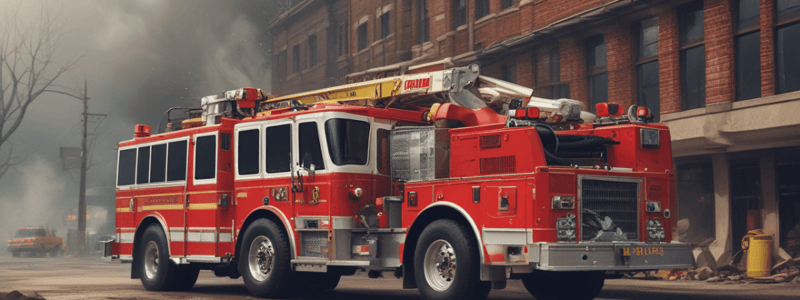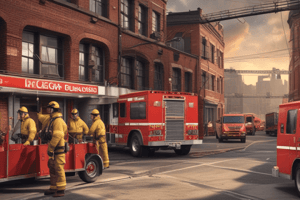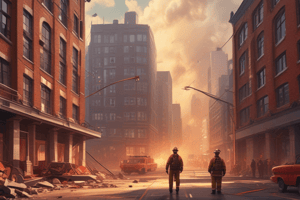Podcast
Questions and Answers
What type of wood is likely to be denser and structurally stronger?
What type of wood is likely to be denser and structurally stronger?
- Composite wood
- Lumber from farmed trees
- Lumber milled from naturally grown trees (correct)
- Engineered wood
Which of the following materials can prevent or limit the spread of fire?
Which of the following materials can prevent or limit the spread of fire?
- Glass
- Wood
- Concrete and masonry (correct)
- Plastic
What affects how wood reacts to fire conditions?
What affects how wood reacts to fire conditions?
- Type of tree only
- Moisture content only
- Size and moisture content (correct)
- Size only
Why do smaller wooden beams need to be protected?
Why do smaller wooden beams need to be protected?
What is the main component of many structural assemblies?
What is the main component of many structural assemblies?
What type of construction uses large wooden beams?
What type of construction uses large wooden beams?
What can affect the fuel load in a building?
What can affect the fuel load in a building?
Which of the following is NOT a common building material?
Which of the following is NOT a common building material?
What is a characteristic of wood with high moisture content in a fire?
What is a characteristic of wood with high moisture content in a fire?
What is a common use of bricks and stones in masonry construction?
What is a common use of bricks and stones in masonry construction?
What is the effect of heat on mortar in masonry?
What is the effect of heat on mortar in masonry?
What is a common use of cast iron in building construction?
What is a common use of cast iron in building construction?
What is a potential consequence of rapid cooling of cast iron with water?
What is a potential consequence of rapid cooling of cast iron with water?
What is a common use of steel in building construction?
What is a common use of steel in building construction?
What is a difference between wrought iron and cast iron?
What is a difference between wrought iron and cast iron?
What is a characteristic of pressure-treated wood in a fire?
What is a characteristic of pressure-treated wood in a fire?
Flashcards are hidden until you start studying
Study Notes
Building Materials
- A variety of materials are used in building construction, including wood, metals, gypsum, glass/fiberglass, and composite materials.
- Each material reacts differently to heat, and understanding their reactions is crucial for firefighting operations.
Wood
- Wood is the most common building material in North America.
- Size and moisture content affect how wood reacts to fire:
- Larger wooden beams are harder to ignite and retain structural integrity.
- Smaller wooden beams lose structural integrity quickly and need protection.
- Lumber from naturally grown trees (old growth trees) is denser and stronger than lumber from farmed trees (new growth trees).
- Wood with high moisture content (green wood) doesn't ignite as readily as kiln-dried or dehydrated wood.
- Pressure-treated wood with fire-retardant chemicals reduces ignition and burn speed, but is not fully effective in reducing fire spread.
Masonry
- Masonry includes bricks, stones, and concrete blocks.
- Masonry is used for veneered walls, decorative covers, and load-bearing walls.
- Fire has minimal effect on masonry:
- Bricks rarely show signs of loss of integrity or deterioration.
- Stones and concrete may experience spalling (surface loss) when heated.
- Concrete blocks may crack but retain basic structural stability.
- Heat can degrade mortar between bricks, blocks, and stone, causing weakening.
Metal
- The effect of heat and fire on metal depends on the type of metal and exposure.
- Metals are used for:
- Structural support
- Decorative covering on exterior walls, stairs, door window frames, ductwork, and pipes
- Fasteners including nails, screws, and plates
- Cast iron and wrought iron are two types of iron used in buildings:
- Cast iron is commonly used for structural support beams, balconies, elevators, stairs, railings, and building facades.
- Wrought iron is used for decoration, nails, straps, tie rods, railings, and balconies.
- Steel is the primary material used for structural support in large buildings and is also used for stairs, wall studs, window and door frames, balconies, and railings.
Studying That Suits You
Use AI to generate personalized quizzes and flashcards to suit your learning preferences.




